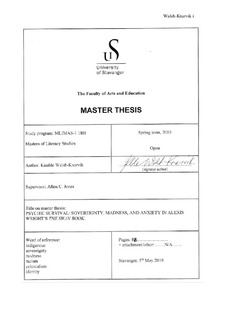PSYCHIC SURVIVAL: Sovereignty, Madness and Anxiety in Alexis Wright's The Swan Book
Master thesis
Permanent lenke
http://hdl.handle.net/11250/2603053Utgivelsesdato
2019-05Metadata
Vis full innførselSamlinger
- Student papers (HF-IKS) [903]
Sammendrag
I argue that through representations of ‘madness’ in The Swan Book, Alexis Wright reclaims and (re-)defines Indigenous sovereignty as embodied, that is, something which for Indigenous people is felt and realised through their corporal being: a form of body-mind connection which includes a reciprocal relationship to ‘Country’. These representations are reflected by a disjointed narrative in which the story and its characters unravel. The novel suggests that the pursuit of social, ontological and psychological stability, is achieved through a relationship to place and accepting responsibility of care for the environment. The quest for sovereignty, allegorised within the novel by Oblivia and her black swans, repositions an Indigenous worldview and connection to Country as central to Indigenous psychic survival. As a result, the Western reader and their world view is destabilised. Repeated exposure to a world in which material and social realities reinforce one’s feelings of inferiority and lack of human-ness, results in a distorted sense of self. A destabilised mental state, a kind of ‘madness’, becomes in truth, the only sane response to the effects of subjugation. Given that racism informs the structural, political and social colonial world, I argue that colonialism is itself a kind of madness. Through its racialised practices and policies Indigenous people have been subjected to violence and trauma that has had and continues to have deleterious effects on their lives. It is this intergenerational trauma and the messy state of internal Aboriginal politics coupled with national politics over sovereignty and land rights that Wright harnesses in order to draw her Indigenous characters as unstable mental entities. Yet, colonialisms’ madness affects all Australians, black and white, evidenced by the anxiety and shame that currently impact non-Indigenous Australian’s identity and sense of place. Australia’s colonial history has rendered Aboriginal people invisible in the national narrative, dispossessed them of their Country (land) and limited their rights to self-determination. Whereas legal and judicial sovereignty seems unattainable for Indigenous people at present in the Australian political climate, the performative nature of narrative/stories opens a horizon of self-identity and self-determination connected to Country which empowers psychological sovereignty.
Beskrivelse
Master's thesis in Literacy Studies

